Pegmove Powder 121.1 gm
MRP ₹290.5
(Inclusive of all Taxes)
₹43.6 Cashback (15%)
About Pegmove Powder 12
Pegmove Powder 12 belongs to the group of medicines called osmotic laxatives used to treat occasional constipation. Constipation refers to infrequent bowel movements in which the stools are often dry, hard and painful to pass. Constipation occurs when the normal muscle contractions in the large intestine slow down, which causes the incomplete elimination of stools from the body.
Pegmove Powder 12 contains ‘Polyethylene glycol’, which causes the water to retain in the stools, thereby stimulating bowel movement. It increases the number of bowel movements, softens the stools and makes it easier to pass. Thereby, Pegmove Powder 12 helps in providing relief from constipation.
Take Pegmove Powder 12 as advised. In some cases, you may experience certain common side-effects such as bloating, gas, nausea, and abdominal pain/cramps. Most of these side effects do not require medical attention and will resolve gradually over time. However, you are advised to talk to your doctor if you experience these side effects persistently.
Consult a doctor before giving Pegmove Powder 12 to children. Do not take Pegmove Powder 12 for more than a week as it might cause dependency on Pegmove Powder 12 for a bowel movement. Talk to your doctor if you notice any sudden changes in bowel habits that persist for over two weeks. Consult your doctor before taking Pegmove Powder 12 if you are pregnant or breastfeeding.
Country of origin
Manufacturer/Marketer address
Online payment accepted

secured payment

india's most trusted pharmacy

genuine products
Composition :
Manufacturer/Marketer :
Consume Type :
Expires on or after :
Return Policy :
Provide Delivery Location
About Pegmove Powder 12
Pegmove Powder 12 belongs to the group of medicines called osmotic laxatives used to treat occasional constipation. Constipation refers to infrequent bowel movements in which the stools are often dry, hard and painful to pass. Constipation occurs when the normal muscle contractions in the large intestine slow down, which causes the incomplete elimination of stools from the body.
Pegmove Powder 12 contains ‘Polyethylene glycol’, which causes the water to retain in the stools, thereby stimulating bowel movement. It increases the number of bowel movements, softens the stools and makes it easier to pass. Thereby, Pegmove Powder 12 helps in providing relief from constipation.
Take Pegmove Powder 12 as advised. In some cases, you may experience certain common side-effects such as bloating, gas, nausea, and abdominal pain/cramps. Most of these side effects do not require medical attention and will resolve gradually over time. However, you are advised to talk to your doctor if you experience these side effects persistently.
Consult a doctor before giving Pegmove Powder 12 to children. Do not take Pegmove Powder 12 for more than a week as it might cause dependency on Pegmove Powder 12 for a bowel movement. Talk to your doctor if you notice any sudden changes in bowel habits that persist for over two weeks. Consult your doctor before taking Pegmove Powder 12 if you are pregnant or breastfeeding.
Uses of Pegmove Powder 12
Key Benefits
Pegmove Powder 12 belongs to the group of medicines called osmotic laxatives used to treat occasional constipation. Pegmove Powder 12 causes the water to retain in the stools, thereby stimulates bowel movement. It increases the number of bowel movements, softens the stools and makes it easier to pass. Thereby, Pegmove Powder 12 helps in providing relief from constipation.
Directions for Use
Storage
Side Effects of Pegmove Powder 12
- Abdominal pain/cramps
- Bloating
- Gas
- Nausea
Drug Warnings
Do not take Pegmove Powder 12 if you are allergic to any of its components. Inform your doctor if you have a bowel obstruction, irritable bowel syndrome, anorexia, or kidney disease. Consult a doctor before giving Pegmove Powder 12 to children. Do not take Pegmove Powder 12 for more than a week as it might cause dependency on Pegmove Powder 12 for a bowel movement; talk to your doctor if constipation lasts for more than a week. Consult your doctor if you are pregnant or breastfeeding. Stop using Pegmove Powder 12 and consult a doctor if you have severe diarrhoea, rectal bleeding, bloody stools, or if the side effects (nausea, abdominal cramps, bloating) get worse, as those might be an indication of a serious condition. Talk to your doctor if you notice any sudden changes in bowel habits that persist for over two weeks.
Drug Interactions
Drug-Drug Interactions: Pegmove Powder 12 may interact with diuretics (furosemide) and bronchodilator (albuterol).
Drug-Food Interactions: No interactions found/established.
Drug-Disease Interactions: Inform your doctor if you have a bowel obstruction, inflammatory bowel syndrome, intestinal obstruction disorder, GI obstruction/perforation, anorexia, or kidney disease.
Drug-Drug Interactions Checker List
- FUROSEMIDE
- ALBUTEROL
Habit Forming
Diet & Lifestyle Advise
- Try maintaining a balanced diet that includes fresh fruits and vegetables.
- Stay hydrated, and drink enough water and fluids.
- Exercise regularly and stay fit.
- Get enough sleep.
- Try making time to empty your bowels whenever the body tells you to.
- Eat food rich in fibre, such as whole-wheat bread, oatmeal, flaxseed, nuts, beans, lentils, fruits (berries, apples, oranges, bananas, pears, figs) and vegetables (broccoli, spinach, sweet potatoes, avocados).
Special Advise
- Pegmove Powder 12 might be habit-forming. Therefore, do not take larger doses or for a longer duration than recommended by the doctor.
Disease/Condition Glossary
Constipation: It refers to infrequent bowel movements. The stools are often dry, painful and hard to pass. Constipation is a condition in which the person has fewer than three bowel movements in a week. However, bowel patterns may vary from person to person. Symptoms include bloating, abdominal pain, and feeling as if the bowel movement is incomplete. Constipation occurs when the muscle contractions in the large intestine slow down, which causes the incomplete elimination of stools from the body. Constipation could be associated with a sudden change of diet, a diet with less fibre, not drinking enough liquids, lack of exercise, loss of tone of the bowel muscles in older people, or having to stay in bed for a longer duration.
FAQs
Disclaimer
Alcohol
Safe if prescribed
It is not known if alcohol interacts with Pegmove Powder 12. Please consult your doctor if you have any concerns regarding this.
Pregnancy
Consult your doctor
Pegmove Powder 12 belongs to pregnancy category C. Please consult your doctor if you are pregnant; your doctor will recommend Pegmove Powder 12 if the benefits outweigh the risks.
Breast Feeding
Consult your doctor
Consult your doctor if you are breastfeeding. Your doctor will decide if Pegmove Powder 12 can be taken by breastfeeding mothers or not.
Driving
Safe if prescribed
Pegmove Powder 12 is unlikely to affect your ability to drive. However, drive only if you are alert.
Liver
Consult your doctor
Please consult your doctor if you have liver impairment/liver disease.
Kidney
Consult your doctor
Please consult your doctor if you have kidney impairment/kidney disease.
Children
Safe if prescribed
Pegmove Powder 12 should be given to children only if advised by the doctor.
Author Details
We provide you with authentic, trustworthy and relevant information
Uses of Pegmove Powder 12
Key Benefits
Pegmove Powder 12 belongs to the group of medicines called osmotic laxatives used to treat occasional constipation. Pegmove Powder 12 causes the water to retain in the stools, thereby stimulates bowel movement. It increases the number of bowel movements, softens the stools and makes it easier to pass. Thereby, Pegmove Powder 12 helps in providing relief from constipation.
Directions for Use
Storage
Drug Warnings
Do not take Pegmove Powder 12 if you are allergic to any of its components. Inform your doctor if you have a bowel obstruction, irritable bowel syndrome, anorexia, or kidney disease. Consult a doctor before giving Pegmove Powder 12 to children. Do not take Pegmove Powder 12 for more than a week as it might cause dependency on Pegmove Powder 12 for a bowel movement; talk to your doctor if constipation lasts for more than a week. Consult your doctor if you are pregnant or breastfeeding. Stop using Pegmove Powder 12 and consult a doctor if you have severe diarrhoea, rectal bleeding, bloody stools, or if the side effects (nausea, abdominal cramps, bloating) get worse, as those might be an indication of a serious condition. Talk to your doctor if you notice any sudden changes in bowel habits that persist for over two weeks.
Therapeutic Class
Drug-Drug Interactions Checker List
- FUROSEMIDE
- ALBUTEROL
Diet & Lifestyle Advise
- Try maintaining a balanced diet that includes fresh fruits and vegetables.
- Stay hydrated, and drink enough water and fluids.
- Exercise regularly and stay fit.
- Get enough sleep.
- Try making time to empty your bowels whenever the body tells you to.
- Eat food rich in fibre, such as whole-wheat bread, oatmeal, flaxseed, nuts, beans, lentils, fruits (berries, apples, oranges, bananas, pears, figs) and vegetables (broccoli, spinach, sweet potatoes, avocados).
Habit Forming
Side Effects of Pegmove Powder 12
- Abdominal pain/cramps
- Bloating
- Gas
- Nausea
Special Advise
- Pegmove Powder 12 might be habit-forming. Therefore, do not take larger doses or for a longer duration than recommended by the doctor.
Disease/Condition Glossary
Constipation: It refers to infrequent bowel movements. The stools are often dry, painful and hard to pass. Constipation is a condition in which the person has fewer than three bowel movements in a week. However, bowel patterns may vary from person to person. Symptoms include bloating, abdominal pain, and feeling as if the bowel movement is incomplete. Constipation occurs when the muscle contractions in the large intestine slow down, which causes the incomplete elimination of stools from the body. Constipation could be associated with a sudden change of diet, a diet with less fibre, not drinking enough liquids, lack of exercise, loss of tone of the bowel muscles in older people, or having to stay in bed for a longer duration.
All Substitutes & Brand Comparisons
RX
Pegmini Powder 255 gm
Cadila Pharmaceuticals Ltd
₹400
(₹1.41/ 1gm)
35% CHEAPERRX
Laxopeg Powder 119 gm
Fourrts India Laboratories Pvt Ltd
₹291.5
(₹2.21/ 1gm)
RX
Laxopeg Powder 255 gm
Fourrts India Laboratories Pvt Ltd
₹552
(₹2.45/ 1gm)
11% COSTLIER

Have a query?

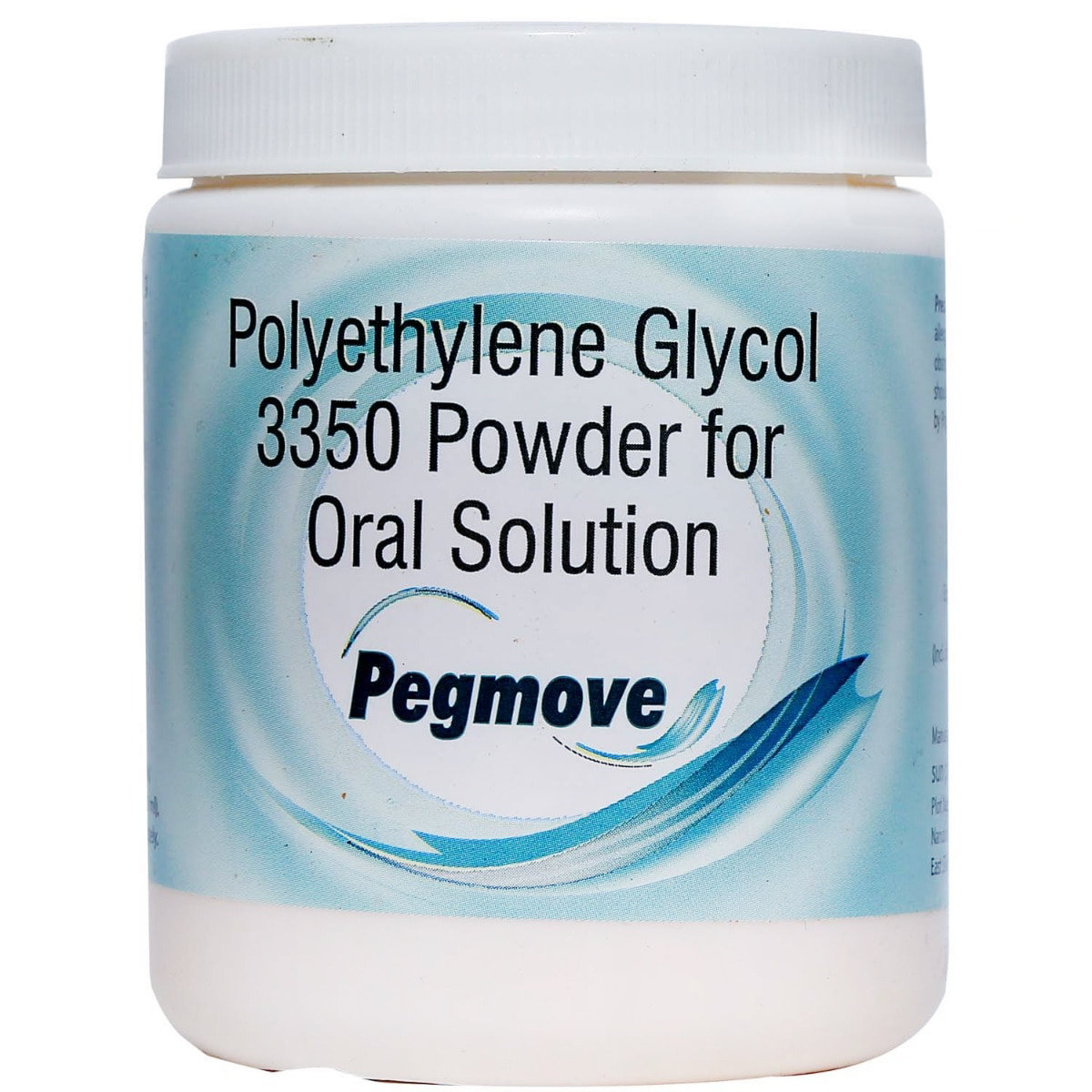
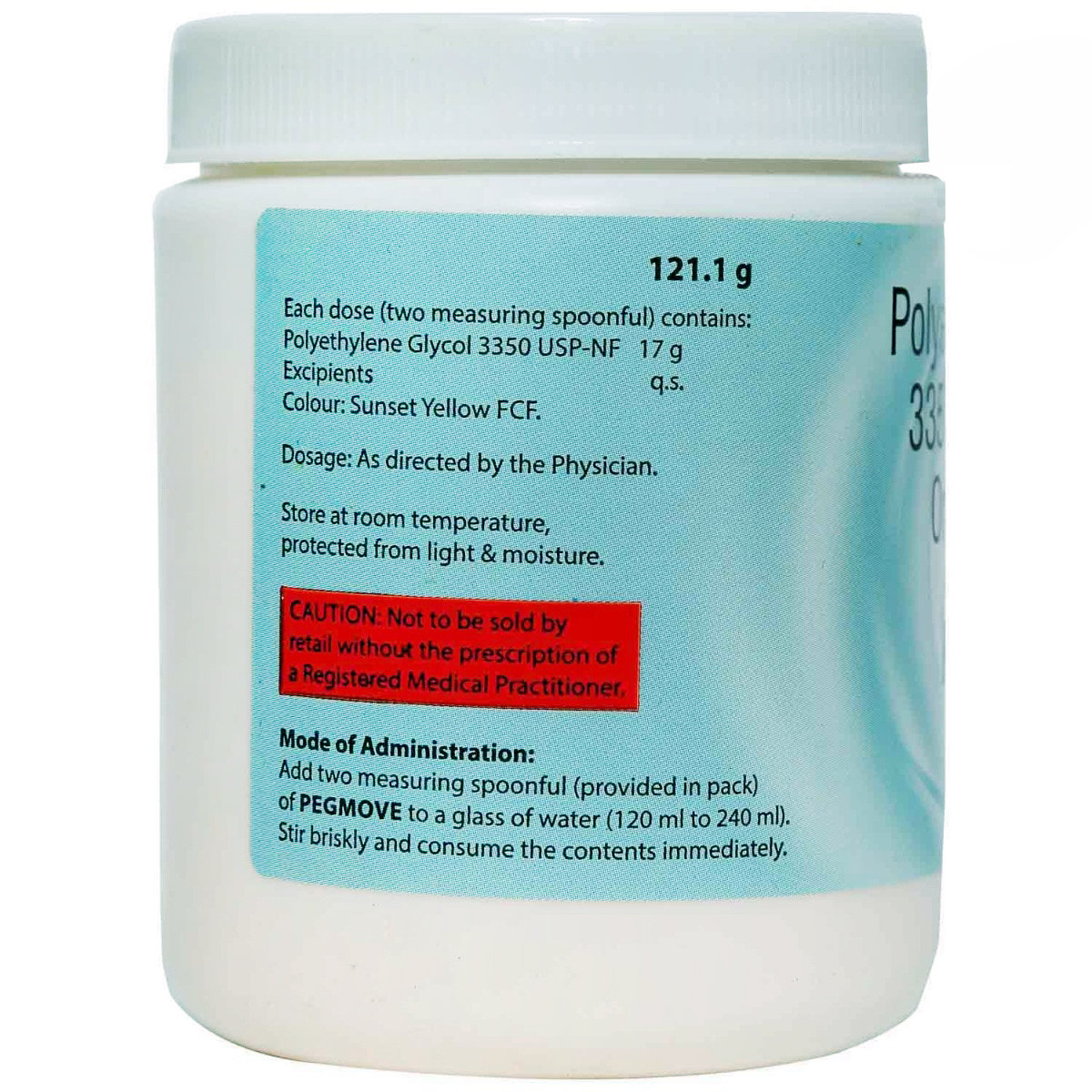










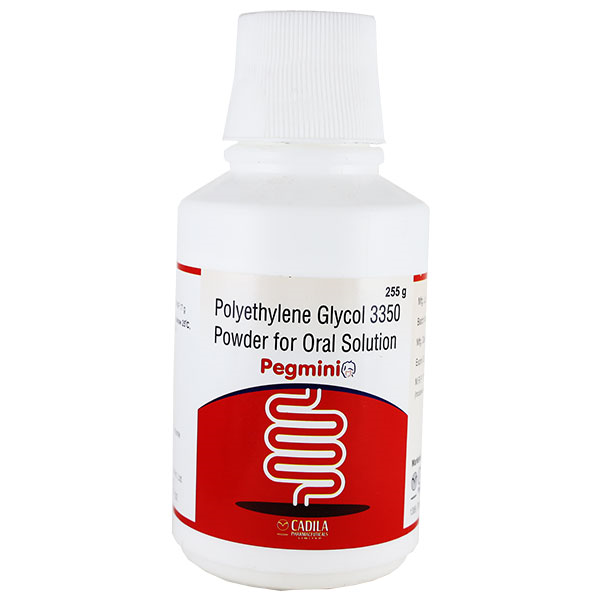
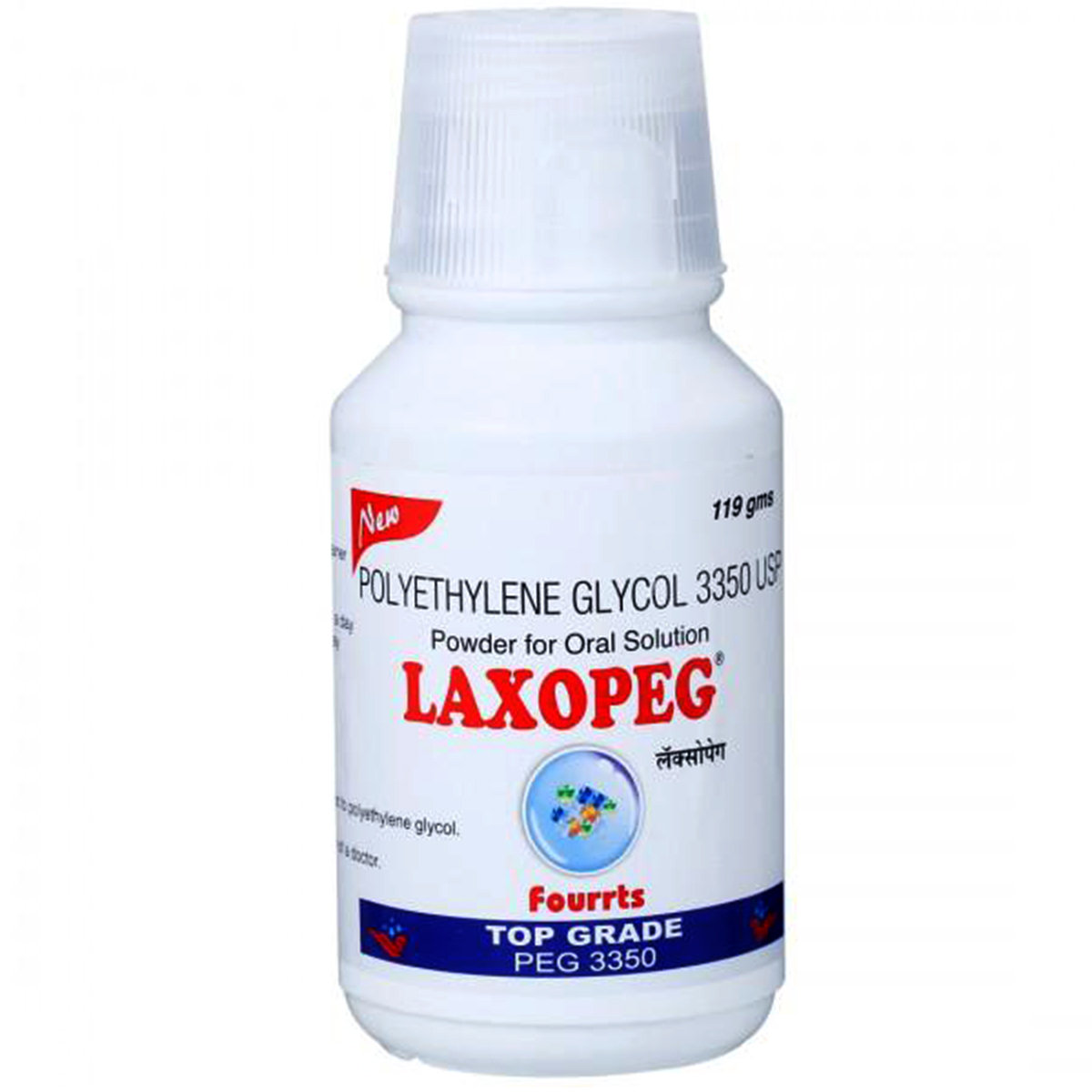

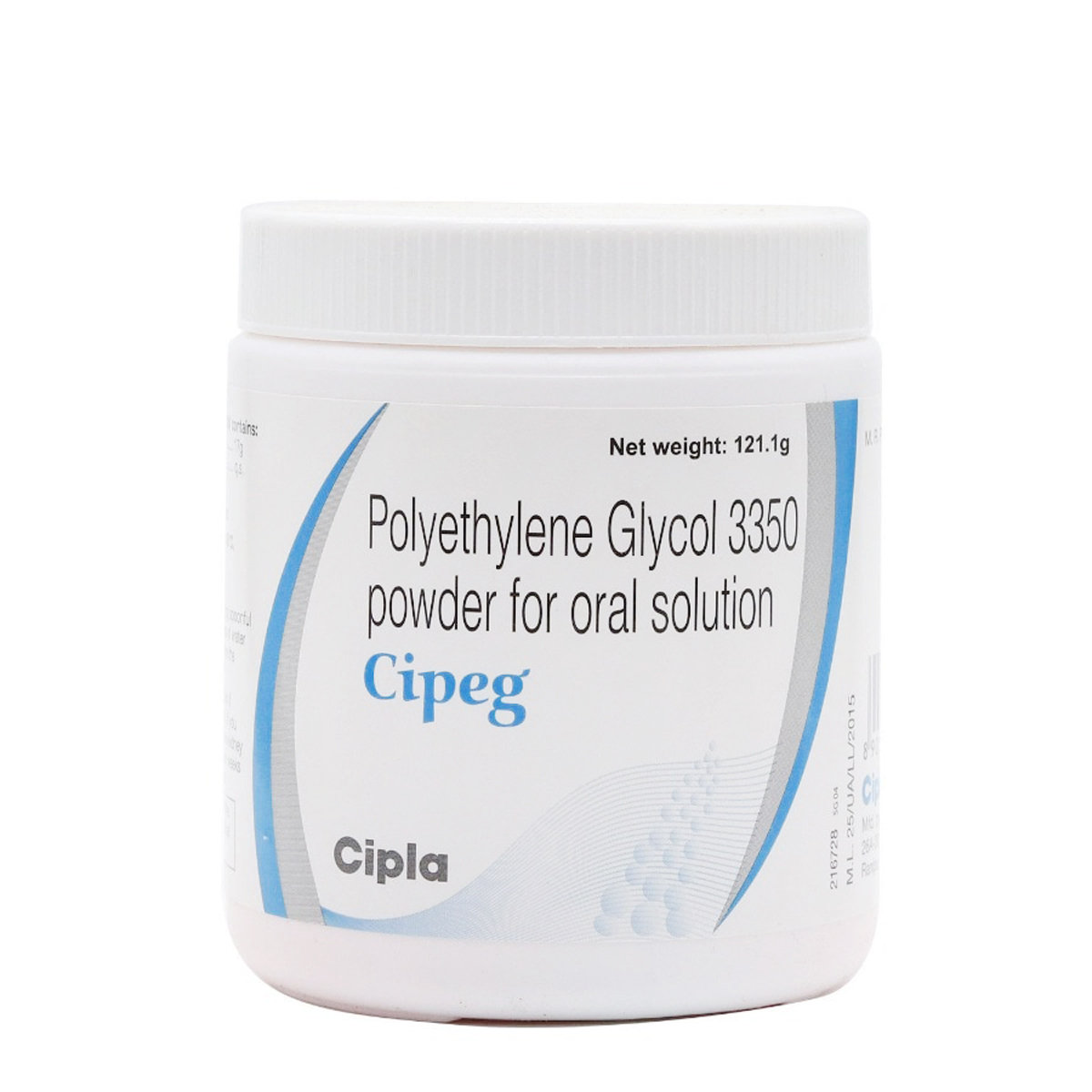
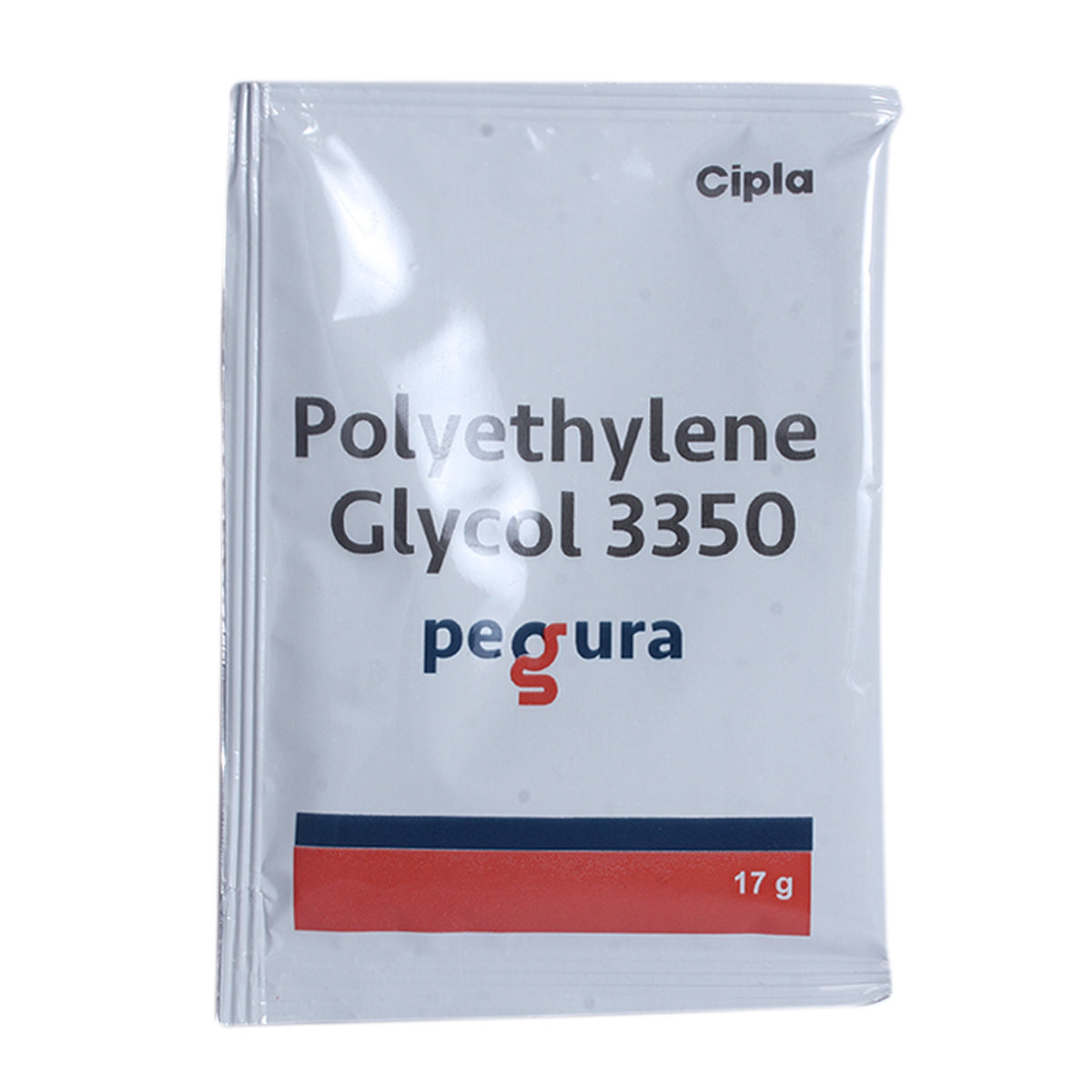

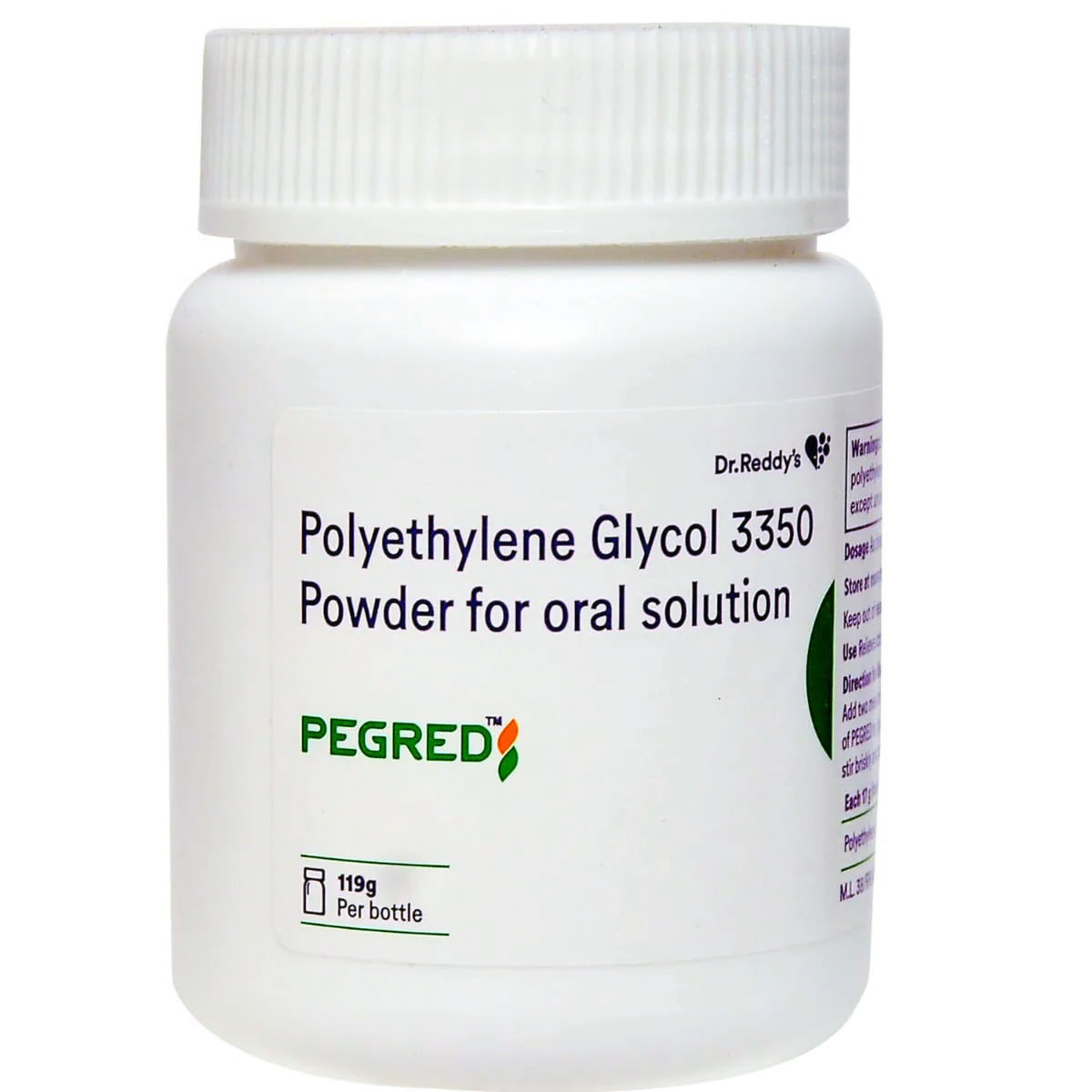

_0.jpg?tr=q-85)



